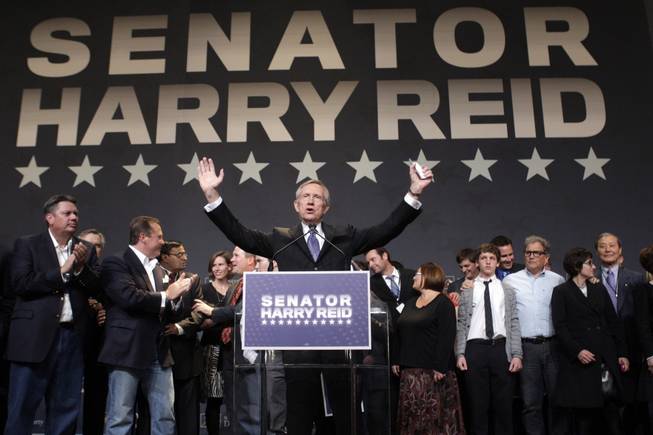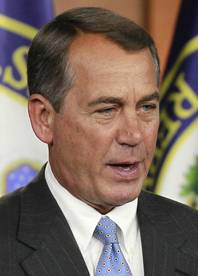
Senate Majority Leader Harry Reid gives a victory speech during a Democratic election party at Aria on Tuesday, Nov. 2, 2010.
Sunday, April 3, 2011 | 2:01 a.m.

John Boehner
Sun coverage
Sun archives
- As Berkley eyes Ensign’s Senate seat, Legislature sharpens redistricting knife (3-13-2011)
- John Ensign will retire after term to avoid ‘exceptionally ugly’ campaign (3-7-2011)
- Dean Heller’s message: Senate seat is mine to lose (2-16-2011)
- Rep. Dean Heller takes poll, leads Sen. John Ensign by 15, inches closer to announcement (2-15-2011)
- Sen. Harry Reid wins fifth term against anti-incumbent fervor (11-2-2010)
Sen. Harry Reid’s re-election was one of the few success stories for Democrats last year. His caucus would like to replicate that victory times 23 next year — the number of Senate seats it’ll be trying to keep blue.
Democrats have made it clear that they think the 2012 campaign started even before the first stroke of the 112th Congress, but their campaign mindset was never so clear as it was last week.
That’s when Sen. Charles Schumer of New York — head of the Democrats’ messaging operation — instructed junior senators to profile House Speaker John Boehner as strapped by the Tea Party, and “always use the word ‘extreme’ ” when describing Republicans’ proposed spending cuts. The jargon is straight from the Reid playbook of 2010, which was repeated like a mantra to describe challenger Sharron Angle, co-opted for the next election cycle.
“Senate Democrats ... are quite comfortable using Reid’s description of these proposals and their overall approach to the GOP as extreme,” said Thomas Mann, a senior fellow with the Brookings Institution, a think tank in Washington.
Senate Democrats are going to have to decide whether adopting the rest of Reid’s 2010 political strategy will keep them in the majority next year.
No one has more riding on that than Reid. If his caucus’ total falls by more than three, he’s out of as majority leader. And that’s only if the president gets re-elected. Ties go to the vice president, so if President Barack Obama loses, Reid can only stand to part with two.
The 21 Democrats and two Democrat-leaning Independents who are either retiring or coming up for re-election in 2012 span the country; about half come from swing states.
Although many are used to tight races — this will be the first re-election cycle for the lawmakers who came to Washington on the Democrats’ upswing midterms in 2006 — those lawmakers aren’t used to defending themselves as incumbents, or reconciling their down-ticket position with a president who doesn’t necessarily have to win their state to keep the White House.
“Many of them are up in states that have been moving to the Republican side,” said James Thurber, director of the Center for Congressional and Presidential Studies at American University. “The most important thing to their races is jobs. That, over everything else, will affect the race ... but after that, I think it’s better to let them do what they need to do at home.”
As far as jobs go, Democrats received a bit of a reprieve last week with a drop in the unemployment rate and an uptick in job growth.
“But there’s going to be great variation across states in terms of what they need to do with the deficit, immigration, health care, so I don’t think leaders will demand that everyone speak in the same language,” Thurber said.
And the “extreme” moniker that was hung on Angle and the Tea Party may not be such a good fit elsewhere.
But Reid’s campaign strategy wasn’t just a buzzword — on the operations side, pollsters and targeted get-out-the-vote efforts played a much larger role. And those could come in handy in the race that could matter most as Reid attempts to keep his leadership reins: the one to replace Sen. John Ensign.
The Democratic Senatorial Campaign Committee identified Nevada’s second U.S. Senate seat as one of its two best pickup opportunities for next November, the other being Massachusetts’ Scott Brown’s.
But Brown has no clear opponent; he’s also got the largest campaign war chest of any Republican facing re-election.
By comparison, Nevada Rep. Dean Heller — although he’s the only mainstream candidate to have declared on the Republican side — is going to face a more uphill battle as he introduces himself to liberal-leaning voters in Southern Nevada.
That race still is in the realm of speculative polls: Heller’s showing he can beat potential Democratic Senate candidate Nevada Rep. Shelley Berkley by double digits; Berkley’s polls — by Reid’s 2010 pollster Mark Mellman — showing she can squeak past him by about 4 points if she runs.
If Reid is hoping, for his own political future, to replay his miracle run of 2010, exporting his strategy might be best done by focusing it close to home.

Join the Discussion:
Check this out for a full explanation of our conversion to the LiveFyre commenting system and instructions on how to sign up for an account.
Full comments policy